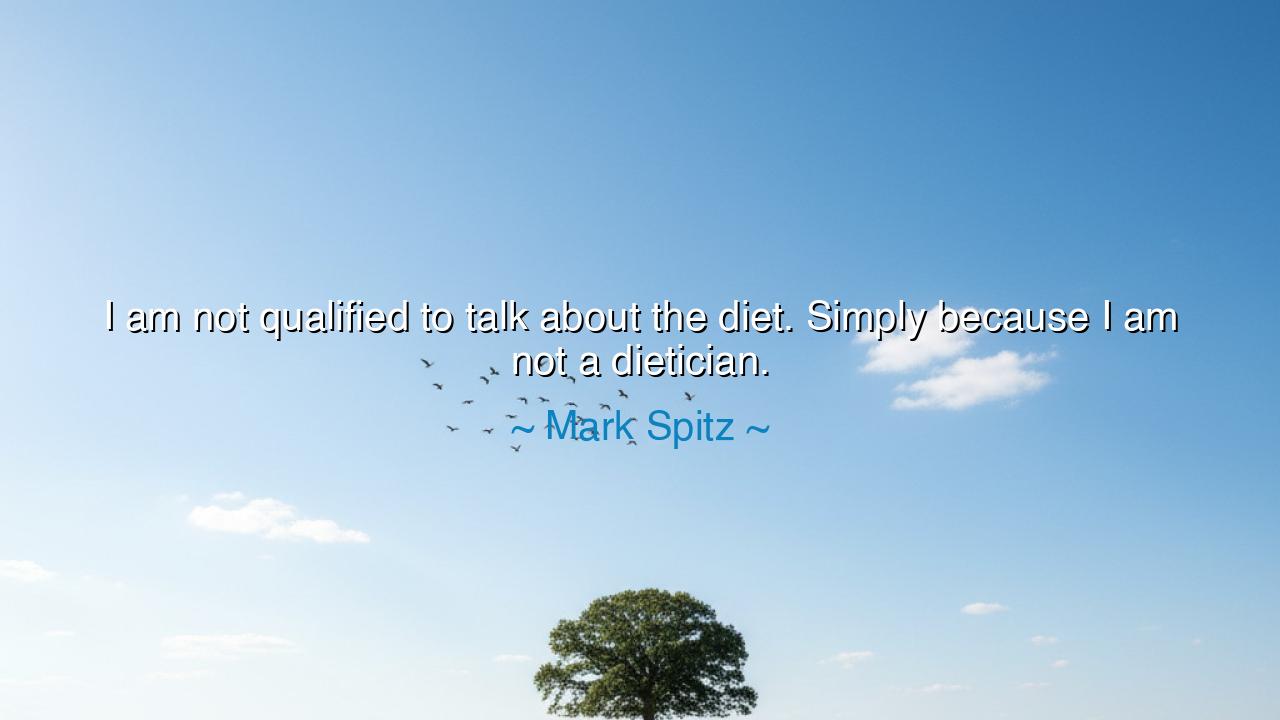
I am not qualified to talk about the diet. Simply because I am






Hear now, O children of wisdom, the words of Mark Spitz, the great Olympian swimmer, whose humble acknowledgment rings with a deeper truth: "I am not qualified to talk about the diet. Simply because I am not a dietician." In these simple words lies a profound lesson on the nature of knowledge, humility, and the importance of wisdom in knowing one’s limits. For to claim expertise is not a matter of mere words, but of understanding and experience in a particular domain.
Spitz, with all his glory and achievement in the realm of swimming, recognized the boundaries of his expertise. He, a man who conquered the waters, did not claim the title of dietician, nor did he seek to offer advice in areas where his knowledge did not reside. This is a noble act in itself, for it speaks of self-awareness, an understanding that true wisdom is not in speaking on matters of which one knows little, but in recognizing when one must defer to those who possess greater knowledge. Humility is a trait revered in the ancient world, for it is through humility that we open ourselves to learning, to growth, and to the realization that expertise is earned, not assumed.
In the days of the great philosophers, such as Socrates, it was understood that wisdom begins in recognizing one’s ignorance. Socrates, the father of Western philosophy, famously claimed that he was wise only because he knew that he knew nothing. This is the core of true knowledge—not in the arrogance of speaking on all matters, but in the recognition that there are those better suited to offer insight where our own understanding falters. Just as Socrates sought out the wisdom of others, so too does Spitz acknowledge that the domain of diet is not his to claim. The ability to step back, to yield to the experts, is a strength, not a weakness.
We must not mistake Spitz’s statement as a denial of the value of a healthy lifestyle. Indeed, his career, built upon discipline, training, and the careful tending of his body, stands as a testament to the importance of knowing what we need to nourish ourselves and perform at our best. But he also understood that nutrition—like swimming—is a specialized field, requiring expertise that he, as a swimmer, did not possess. In this, we are reminded of the ancient warriors who, although skilled in combat, knew when to turn to the strategists, the healers, and the advisors who could guide them in areas outside their own experience.
Consider the great generals of history, such as Napoleon Bonaparte, who, despite his military brilliance, relied on a vast network of experts—logisticians, engineers, and physicians—each a master in their own field. Napoleon’s greatness was not in trying to master every subject, but in understanding the importance of surrounding himself with those who could offer the guidance he lacked. Leadership, in the truest sense, is knowing when to speak and when to listen, when to act and when to defer. This is the wisdom we should carry forward, just as Mark Spitz, with his own success, humbly deferred to those with the true knowledge of diet.
Thus, the lesson we learn from Spitz’s words is clear: recognize your own limitations and be humble enough to seek out the expertise of others. In a world where every person is often tempted to speak on every subject, there is wisdom in knowing when to remain silent, when to listen, and when to trust those who have dedicated their lives to their craft. Just as a warrior must respect the healer, so too must we respect those who specialize in areas outside our own experience.
In practical terms, this means we must cultivate a sense of discernment in our lives. If we seek guidance in matters of health, let us turn to the professionals—the dieticians, the doctors, the nurses—who have the knowledge and training to help us. In matters of love, let us seek the advice of those who have walked that path with wisdom and understanding. In every area of life, let us recognize that we are not experts in everything, and that true strength lies in knowing where our knowledge ends and the knowledge of others begins. Let humility guide us to greater wisdom and, in turn, let wisdom guide us to a fuller, richer life.






AAdministratorAdministrator
Welcome, honored guests. Please leave a comment, we will respond soon